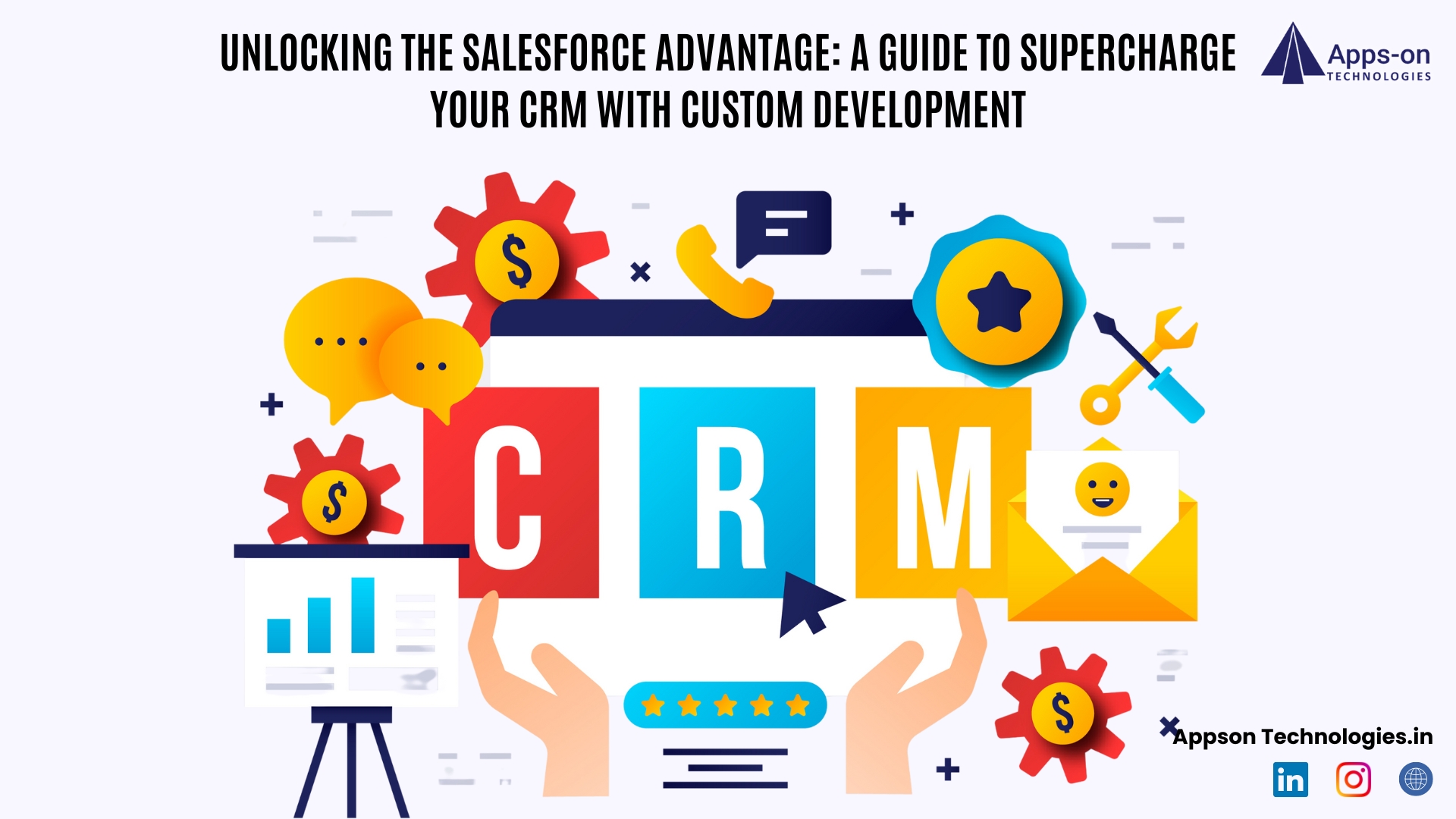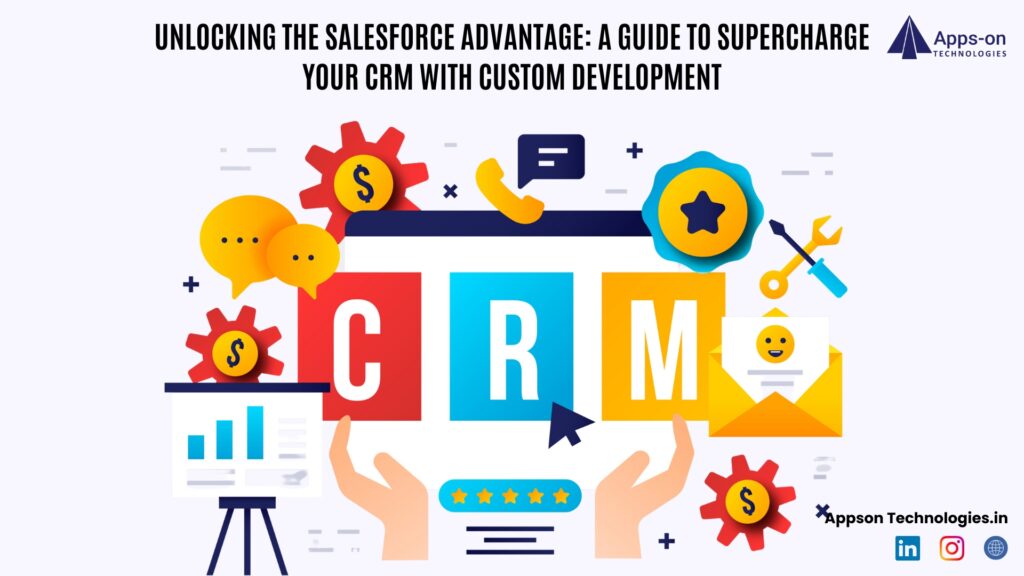Unlocking the Salesforce Advantage: A Guide to Supercharge Your CRM with Custom Development

by admin

In the dynamic world of customer relationship management (CRM), one platform reigns supreme: Salesforce. Offering a robust cloud-based solution, Salesforce empowers businesses of all sizes to cultivate stronger customer relationships, drive sales, and achieve sustainable growth. However, maximizing the value of your Salesforce investment often hinges on a strategic approach – Salesforce development.
Salesforce Development: Tailoring the CRM to Your Business Needs
Salesforce development goes beyond simply utilizing the platform’s out-of-the-box functionalities. It’s the art of customizing and extending Salesforce to seamlessly align with your specific business requirements. This encompasses various aspects, including:
Building Custom Applications: Salesforce development empowers you to create bespoke applications that integrate flawlessly with your existing Salesforce instance. These applications can address industry-specific needs or functionalities not natively available within the platform. Imagine a custom loyalty program app for your retail business or a real-time quote generation tool for your manufacturing company – these are just a few examples of how custom applications bridge crucial gaps and enhance your CRM’s capabilities.
Automating Workflows: Salesforce development is a champion of efficiency. Repetitive tasks that consume valuable time for your sales and customer service teams can be automated through custom workflows. Think automatic lead nurturing campaigns, real-time data validation upon form submission, or even automated quote generation based on pre-defined parameters. By automating these workflows, you free up your team to focus on more strategic initiatives and build stronger relationships with customers.

Data Integration: A Holistic View
Customer data is the lifeblood of any successful CRM strategy. But true power lies in unifying this data from various sources. Salesforce development facilitates seamless integration with external business systems like marketing automation platforms, accounting software, and e-commerce platforms. This creates a centralized data hub, providing a holistic view of your customers across all touchpoints. Imagine integrating customer purchase history from your e-commerce platform with their support tickets in Salesforce – this empowers your customer service team to personalize interactions and deliver exceptional service.
Enhancing User Experience: Tailored for Success
A user-friendly CRM fosters higher adoption rates and drives user satisfaction. Salesforce development allows you to customize the user interface (UI) and user experience (UX) of your Salesforce instance specifically for your sales and customer service teams. This may involve creating custom fields, layouts, and functionalities that cater to their workflows and preferences. Think of building a custom dashboard that displays key performance indicators (KPIs) most relevant to your sales team or creating a simplified lead management interface for your customer service representatives. By tailoring the UI/UX, you encourage user adoption and empower your teams to leverage the full potential of Salesforce.
The Compelling Case for Salesforce Development
Investing in Salesforce development can be a game-changer, propelling your business towards success. Here are some key benefits to consider:
Boosted Efficiency: Automated workflows streamline processes, freeing up valuable time for your teams. Imagine a customer service representative no longer manually entering data across different systems – thanks to Salesforce development, data flows automatically, allowing them to focus on resolving customer issues promptly.
Enhanced Productivity: Custom applications tailored to your specific needs streamline tasks and expedite processes. For example, a custom quote generation application eliminates the need for manual calculations and data entry, enabling your sales team to create and send quotes faster, leading to more closed deals.
Data-Driven Decision Making: Seamless data integration provides a 360-degree view of your customers. Imagine insights gleaned from analyzing customer service interactions alongside their purchase history – this empowers you to make informed decisions based on data-driven insights, leading to improved customer experiences and targeted marketing campaigns.
Competitive Advantage: Standing out from the crowd is crucial. Salesforce development allows you to build functionalities that directly address your unique business challenges and customer needs. This can be anything from a custom product configurator for complex B2B sales to a loyalty program management application for increased customer retention – these unique features differentiate you from competitors and lead to higher customer satisfaction and loyalty.
Scalability and Flexibility: Your business is dynamic, and your CRM needs to adapt as well. Salesforce development allows you to customize and extend the platform to accommodate your evolving requirements. As your team grows or your product offerings expand, you can easily build upon your existing Salesforce foundation, ensuring your CRM scales seamlessly alongside your business.
Charting Your Course: Approaches to Salesforce Development
Several avenues exist to embark on your Salesforce development journey. Here are some key options to consider:
In-House Development Team: Building an in-house Salesforce development team offers the highest level of control and customization. However, this approach requires recruiting and retaining skilled Salesforce developers, which can be a time-consuming and expensive endeavor.
Managed Service Providers (MSP):
Partnering with a Managed Service Provider (MSP) experienced in Salesforce development offers several advantages. Imagine access to a team of skilled developers without the burden of in-house recruitment and management. MSPs provide expertise, resources, and ongoing support, ensuring your Salesforce development projects are completed efficiently and effectively.
Low-Code/No-Code Development Tools:
Salesforce offers a suite of low-code/no-code development tools that empower citizen developers (individuals within your organization without extensive coding knowledge) to create basic customizations. Imagine empowering your marketing team to build a custom landing page within Salesforce or allowing your sales team to create simple reporting dashboards – these tools provide a user-friendly approach for basic customizations without the need for extensive coding expertise.
The Strategic Choice: Aligning with Your Business Goals
The optimal approach to Salesforce development hinges on your specific needs, resources, and budget. Here are some key considerations:
Complexity of Requirements: Highly complex functionalities may necessitate an in-house development team or a seasoned MSP. For simpler customizations, low-code/no-code tools or a less specialized MSP might suffice.
Budgetary Constraints: In-house development teams can be expensive. MSPs offer a scalable cost structure, while low-code/no-code tools are typically the most cost-effective option.
Internal Skillset: If your organization already has skilled Salesforce developers, an in-house team might be a viable choice. However, for organizations lacking internal expertise, partnering with an MSP can be advantageous.
By carefully evaluating these factors, you can choose the approach that best aligns with your business goals and ensures you leverage the full potential of Salesforce development.
Unlocking the Salesforce Advantage
Salesforce development is not simply a technical endeavor; it’s a strategic investment in the future of your customer relationships. By tailoring Salesforce to your specific needs, you empower your teams, gain valuable data-driven insights, and ultimately achieve sustainable growth.
Are you ready to unlock the true potential of Salesforce for your business? Consider embarking on a Salesforce development journey and witness the transformative power of a customized CRM that fuels exceptional customer experiences and drives business success.
Recommended Posts
Beyond the .NET Horizon
May 1, 2024




